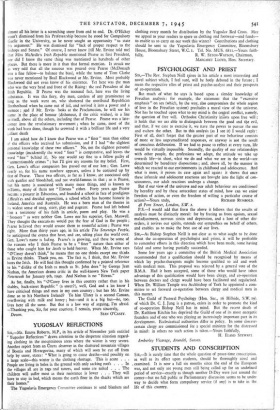PSYCHOLOGIST AND PRIEST
Sm,—The Rev. Stephen Neill raises in his article a most interesting and novel subject which, I feel sure, will be hotly debated in the future ; I mean the respective roles of priest and psycho-analyst and their prospects of co-operation.
But much of what he says is based upon a slender knowledge of Freudian analysis: for example, the statement that the "excessive emphasis" on sex (which, by the way, also compromises the whole region of love in the Freudian system) precludes a moral view of the universe. Nor has he touched upon what to my mind is the central conflict, namely, the question of free will. Orthodox Christianity insts upon free will ; it holds that we are able to distinguish between the good and the evil, and that, if we care to exercise it, we have the power to pursue the one and eschew the other. But to this analysis (as I see it) I would reply: First of all, don't forget that the greater part of our behaviour consists of more or less unpremeditated responses, or anyway is not the result of conscious deliberation. If we had to pause to reflect at every turn, life would be virtually impossible. Secondly, the quality of our relationships with other people, the professions we adopt, the attitude we take up towards life—in short, what we do and what we are in the world—are determined by hereditary dispositions ; and, above all, by the manner in which we reacted to our environments in childhood and adolescence. And what is more, it proves its case again an.I again: it shows that once these infantile and adolescent reactions are brought into the light of con- sciousness, our adult reactions undergo a change.
But if our view of the universe and our adult behaviour are conditioned by heredity and by these antecedent states of mind, how can we enjoy freedom of action, or even the freedom of willing a particular course of
action?—Yours truly, RICHARD RUMBOLD. 48 Pont Street, London, S.W. x.
P.S.—I would add that from the above it follows that the results of analysis must be distinctly moral: for by freeing us from egoism, sexual maladjustment, nervous strain and depression, and a host of other dis- orders, it revives our spirits, extends our sympathies on behalf of others, and enables us to make the best use of our lives.






























 Previous page
Previous page